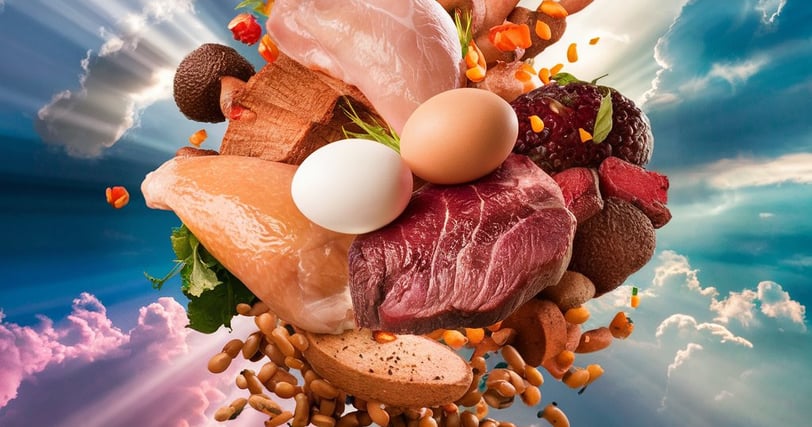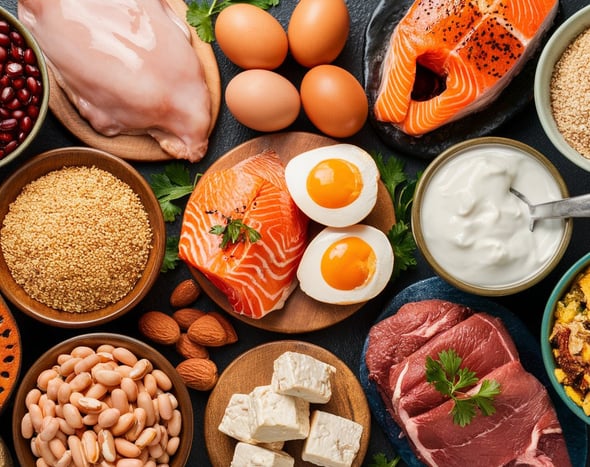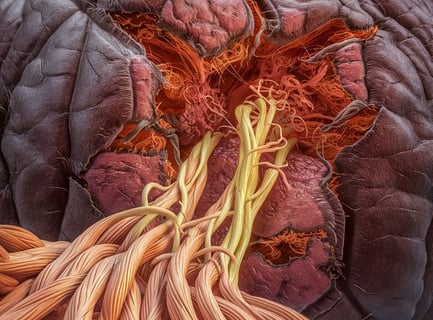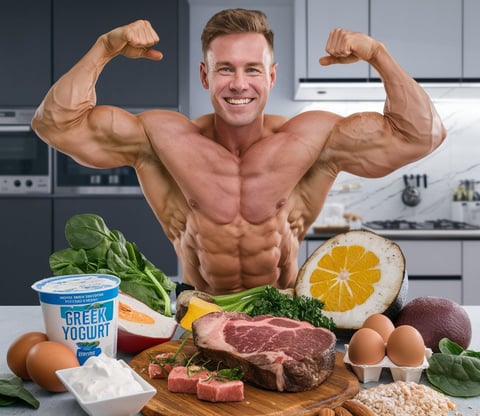Yourhealthmatter
Build Muscle Faster with These 10 High-Protein Foods
Build muscle faster with these 10 high-protein foods. Discover the best sources of protein to fuel your workouts and support muscle growth and recovery.
WELLNESS
12/16/20245 min read


Build Muscle Faster with These 10 High-Protein Foods


Why Protein is Essential for Muscle Building?
Protein is the cornerstone of muscle growth and recovery. Whether you're lifting weights, performing resistance exercises, or engaging in high-intensity training, your muscles endure stress and micro-tears. Protein plays a vital role in repairing these tears, strengthening muscles, and promoting growth.
Key Reasons Protein Is Essential for Muscle Building:
Provides Building Blocks for Muscles
Proteins are made up of amino acids, the building blocks of muscle tissue. When you consume protein, your body breaks it down into amino acids, which are used to repair and rebuild damaged muscle fibers. This process, known as muscle protein synthesis (MPS), is essential for increasing muscle size and strength.
Supports Recovery After Workouts
Intense workouts create micro-damage in your muscle tissues. Protein helps accelerate recovery by replenishing amino acid levels and reducing muscle soreness, enabling you to train consistently without prolonged downtime.
Stimulates Muscle Protein Synthesis
Consuming protein after exercise enhances muscle protein synthesis. Research shows that the presence of leucine, a branched-chain amino acid (BCAA) found in protein sources like eggs, chicken, and whey, is particularly effective at stimulating MPS.
Prevents Muscle Loss
Without adequate protein intake, your body may break down existing muscle tissue to meet its amino acid needs. Sufficient protein intake prevents muscle catabolism (breakdown), especially during calorie deficits or weight loss phases.
Supports Overall Strength and Performance
Proteins do more than build muscles. They are also integral to the production of enzymes, hormones, and immune cells that influence performance and recovery. A protein-rich diet ensures your body has the resources it needs to function optimally during training.


The Top 10 Protein Sources:
Chicken Breast
Chicken breast is a staple for athletes because it is lean, affordable, and versatile. It provides high-quality protein without much fat. Per 100 grams of cooked chicken breast, you get 165 calories, 31 grams of protein, 3.6 grams of fat, and 0 grams of carbohydrates. It is also rich in B vitamins, especially niacin and B6, which support energy metabolism and muscle function.
Eggs
Eggs have a perfect amino acid profile, containing all nine essential amino acids in optimal proportions for muscle building. The yolk adds healthy fats and essential micronutrients. One large egg provides approximately 70 calories, 6 grams of protein, 5 grams of fat, and 0.5 grams of carbohydrates. Eggs are an excellent source of choline, which supports brain health and muscle function, and Vitamin D, which is crucial for bone health.
Salmon
Salmon combines high protein content with omega-3 fatty acids, which reduce muscle soreness and inflammation. Per 100 grams of cooked salmon, you get 206 calories, 22 grams of protein, 13 grams of fat (mostly healthy fats), and 0 grams of carbohydrates. It is also an excellent source of Vitamin B12, selenium, and potassium. Omega-3s are essential for heart and joint health, making salmon a powerhouse food for recovery and overall wellness.
Greek Yogurt
Greek yogurt contains both casein and whey protein, making it ideal for muscle recovery and sustained amino acid release. In 100 grams of plain, non-fat Greek yogurt, there are 59 calories, 10 grams of protein, 0.4 grams of fat, and 3.6 grams of carbohydrates. It is also high in probiotics, which support gut health, and calcium, which strengthens bones.
Whey Protein Powder
Whey protein powder is one of the fastest-absorbing protein sources, making it perfect for post-workout recovery. A typical 30-gram scoop of whey protein powder provides 120 calories, 24 grams of protein, 1 gram of fat, and 2 grams of carbohydrates. Many whey powders are fortified with branched-chain amino acids (BCAAs), such as leucine, which directly stimulate muscle protein synthesis.
Lentils
Lentils are a plant-based protein source that is affordable, high in fiber, and easy to include in meals. In 100 grams of cooked lentils, you get 116 calories, 9 grams of protein, 0.4 grams of fat, and 20 grams of carbohydrates. Lentils are also rich in iron, folate, and magnesium, which aid in oxygen transport, energy production, and muscle contraction.
Tofu/Tempeh
Tofu and tempeh are soy-based foods that are complete proteins, making them excellent options for vegetarians and vegans. In 100 grams of firm tofu, there are 144 calories, 15 grams of protein, 8 grams of fat, and 2 grams of carbohydrates. These foods are also high in calcium and magnesium, supporting bone health and muscle relaxation. Tempeh, in particular, contains probiotics, which benefit gut health.
Cottage Cheese
Cottage cheese is packed with casein protein, which digests slowly, making it ideal for sustained muscle repair, especially overnight. In 100 grams of low-fat cottage cheese, there are 81 calories, 11 grams of protein, 3 grams of fat, and 3 grams of carbohydrates. Cottage cheese is also rich in calcium and phosphorus, essential for strong bones.
Quinoa
Quinoa is a complete protein that also provides carbohydrates for energy, making it a great option for post-workout meals. In 100 grams of cooked quinoa, there are 120 calories, 4 grams of protein, 1.9 grams of fat, and 21 grams of carbohydrates. Quinoa is high in magnesium, which supports muscle contraction and recovery.
Lean Beef
Lean beef provides a high amount of protein along with essential nutrients like iron and zinc, which support muscle oxygenation and recovery. In 100 grams of cooked 90% lean beef, there are 250 calories, 26 grams of protein, 15 grams of fat, and 0 grams of carbohydrates. Lean beef also contains creatine, which enhances strength and power during workouts, and Vitamin B12, which aids in energy production.
Including these protein sources in your diet ensures you get the nutrients needed for muscle growth, recovery, and overall performance. Rotating between animal and plant-based options can help create a well-rounded, nutritious meal plan.
Conclusion
Protein is the foundation of muscle growth, recovery, and overall performance. Incorporating a variety of protein-rich foods into your diet ensures that you get all the essential amino acids and nutrients your body needs to repair and build muscle effectively. Whether you choose lean meats like chicken breast and beef, versatile staples like eggs and Greek yogurt, or plant-based options like lentils and quinoa, each source offers unique benefits to support your fitness goals.
Remember, balance and consistency are key. Pair these protein sources with a well-rounded diet, regular exercise, and adequate rest to maximize your results. By making protein a priority in your meals, you'll fuel your body for success, enhance your workouts, and achieve your muscle-building goals.


Wellness
Your source for health and wellness insights.
© 2024. All rights reserved.
